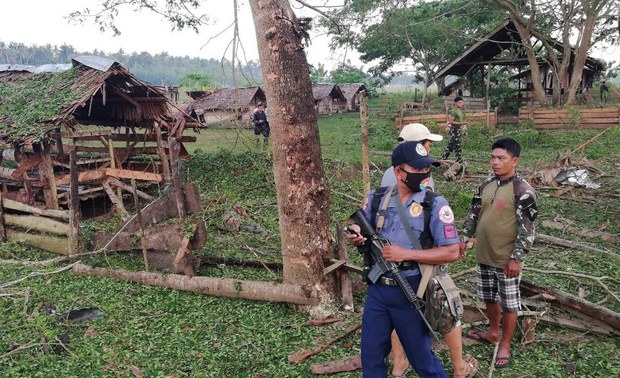IS Claims Car Bombing That Killed At Least 10 in Southern Philippines
2018.07.31
Basilan and Cotabato, Philippines
 A police officer stands a few feet from a checkpoint where a car bomb exploded on the southern Philippine island of Basilan, July 31, 2018.
A police officer stands a few feet from a checkpoint where a car bomb exploded on the southern Philippine island of Basilan, July 31, 2018.
Updated at 12:43 p.m. ET on 2018-07-31
A van exploded at a military checkpoint on the southern Philippines island of Basilan on Tuesday, killing at least 10 people, a military official said, in what the Islamic State claimed was a suicide attack carried out by a Moroccan.
Among those killed were a soldier, four members of a pro-government militia unit and several civilians, including a mother and a child, said Col. Fernando Reyeg, the commander of the military’s Task Force Basilan.
“Right now, the investigation is going on. We are looking also on possible suicide bombing,” Reyeg said. “There were reports the driver was foreign-looking.”
The attack, which occurred at a military road block outside Basilan’s Lamitan town, came days after President Rodrigo Duterte wooed the Abu Sayyaf militants to the peace negotiating table and joked he would give them an award.
Duterte proposed the peace talks two days after approving a law allowing Muslims in the predominantly Roman Catholic nation to form a new autonomous region with control on local taxation and education, but with security still administered by the national government.
Reyeg said the explosion killed the van’s driver, with the blast leaving a crater on the ground and virtually obliterating the suspect. The driver appeared nervous after soldiers flagged him down at the roadblock shortly before 6 a.m.
Hours after the attack, IS’s Amaq News Agency reported it claimed responsibility, according to SITE Intelligence Group, a U.S.-based consultancy that monitors online communications among Islamic militant groups worldwide.
“The Islamic State (IS) identified a Moroccan as the executor of a suicide bombing on Filipino soldiers on Basilan island in the Philippines,” SITE said.
Earlier, the military had received intelligence reports that Abu Sayyaf was planning to carry out bombings in the area, Reyeg said.
“We launched an operation immediately and intercepted the vehicle. In the process of checking, the driver looked suspicious and when our soldiers were approaching the explosion happened,” Reyeg said.
In Manila, presidential spokesman Harry Roque condemned what he called a “terrorist attack.”
“Authorities are now investigating the incident even as we vow to bring the perpetrators of this brazen attack to justice,” Roque said.
Roderick Furigay, vice mayor of Lamitan town, told reporters this was the first suicide attack using a car bomb in the city, a mixed Muslim-Christian area.
Among the fatalities, according to Furigay, was the detachment commander of 19th Special Forces, a woman and a child. Five scout rangers, including a young lieutenant, were injured.
Rep. Gary Alejano, a former Marine captain, also condemned the attack.
“The incident is more alarming considering that Mindanao is still currently under martial law,” he said. “Military intelligence-gathering should have intensified because they have full control over the area.”
During a visit to the south last week, Duterte invited the Abu Sayyaf to talk peace, disregarding a longstanding government policy against talking to a terrorist group blamed for the beheadings of foreign hostages.
The Philippines has a policy against negotiating with terrorists, including Abu Sayyaf, which has been listed as a foreign terrorist organization by the United States and is blamed for a string atrocities stretching back to the 1990s.
Apart from deadly bombings, the group is wanted for the beheadings of hostages, including a German national and two Canadians during the last two years. It was also blamed for blowing up a passenger ferry on Manila Bay that killed more than 100 people in 2004.
One of its commanders, Isnilon Hapilon, became the leader of the Philippines’ IS faction and last year led an attack on the southern city of Marawi, a former major Muslim trading hub. Hapilon was killed near the end of the five-month siege that destroyed the city and left at least 1,200 people dead, most of them militants.
Richel V. Umel from Iligan City contributed to this report.







